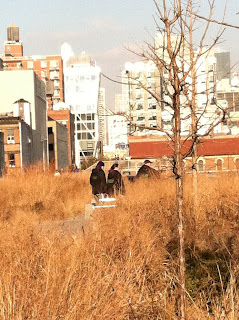 Happy 2012.
Happy 2012.
I’ve avoided writing a column here for a little while, not only because I genuinely couldn’t think of anything good to write, but because of a growing discomfort with living my life online, with having strangers pour over the minutaie of my thoughts and ideas. I’ve been struggling with what it means to be a writer -a journalist, reporter, novelist, scribe, screenwriter, what-have-you -in the 21st century, and after two months, I still don’t have a decent answer. So let’s start with “home” – it’s been on my mind, and perhaps, in light of the passed holiday season, yours too.
When I moved to New York last March, I had the distinct feeing I was returning home. I didn’t know why; I wasn’t born there, though I visited frequently as a teen and into my twenties. I always felt comfortable in New York: I had my favorite spots as an adolescent that included Tower Records, Reminiscence, and long-goners
The Grand Ticino, and
Cafe Mozart. I ran into photographers Matthew Rolston and Albert Watson in the Village. I saw Pavarotti at the Met.
I got my Broadway tickets through a friend who worked in the second tower at
1 World Trade Center. I was out so late it was early at the Five Spot and God knows what other jazz spots I wasn’t supposed to be in (being under 21). I never thought twice about wandering around alone, taking pictures and notes and mental snapshops of the smell, the look, the sheer… feeling of the Big Bad Apple of the late 80s and early 90s.

It’s hard to describe to someone who’s not been there. I’ve a friend who’s breaking her Big Apple cherry in March, and though the list of “you must go to”s keeps growing, I remind myself that every single person has a different experience. It’s like getting
your very own personalized Ben & Jerry’s flavor: it has all the things you love, with little bits and bobs of everyone else’s yumyums, but you know it was made just for you, with a stamp in the middle when you open the lid saying START SPREADING THE NEWS. I found that flavor when I moved last year, and I had every argument with myself about why I didn’t deserve a flavor:
I’m too stupid, I’m not connected, I’m too old, I’m not pretty, I’m scared. What? Gluttony’s in my veins. Gluttony shrieks for a metropolis that lives and breathes in a twenty-four hour cycle of survival, sweat, sex, sales, and rough-hewn savoir-faire. Gluttony has nothing to do with looks or connections or smarts. Gluttony doesn’t respect fear. To experience the full flavor, I only had to step outside and look around. It was so simple.
And so New York became (indeed always was) home for me in a way Toronto never was, and never will be. This acknowledgment, made foolishly public, garnered no small bit of surprise, even shock, in social (and social media) circles.
“But you were born here,” people will say, not trying too hard to hide their dis-ease and judgement.
“They’re crazy down there,” others will add with full passive-aggressive smirkiness. I don’t know what to make of the haterating, but I have my theories, the most obvious being Tall Poppy Syndrome, surely an umbilical leftover tied to Mummy Britain.

Theorizing aside, home, for me, has f*ck all to do with where you’re born.
Gabriel Byrne spoke about this very concept in May when he introduced Edna O’Brien at her reading for Saints and Sinners, his notion of Irish writerly creativity being tied up with what “home” means, of one neither comfortable in one’s adopted homeland, nor in the place one was born. I experienced that during a visit I made last month. It was bittersweet, surreal, and strange. I was home, but I no longer had an apartment. I had no base, but I was home, and I had everywhere to go. The sheer thrill of being there made me leap out of bed and thank some gritty unknown power. Living there inspired me to write page after page of ideas, observations, goals, experiences, and to get in touch with friends new and old. It scared the life out of me. It woke me up. I knew returning to Canada would kill me on some level, and it was a murder I had to accept as inevitable.
Returning to Canada this time around underlined that home is, indeed, where your heart is. Perhaps we have to accept the mercy killings of small parts of ourselves until we can get back to where we are truly meant to be. Perhaps the ashes from those graves can be used to make something entirely new, in a place that feels entirely, luxuriously ancient, a glorious mish-mash of deja-vu, fate, hope, faith, and sheer teeth-gnashing determination. Here’s to that creation growing into something beautiful in 2012.
Photos from my Flickr photostream.



